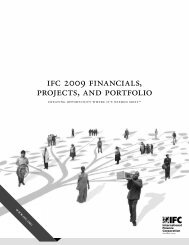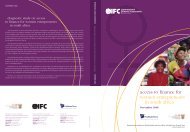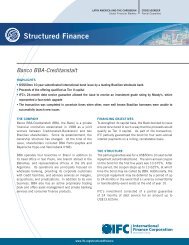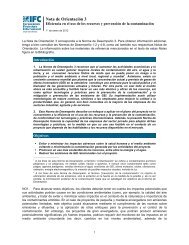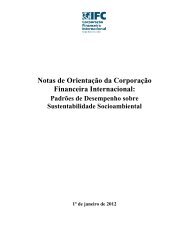Corporate Governance for Banks in Southeast Europe: Policy - IFC
Corporate Governance for Banks in Southeast Europe: Policy - IFC
Corporate Governance for Banks in Southeast Europe: Policy - IFC
You also want an ePaper? Increase the reach of your titles
YUMPU automatically turns print PDFs into web optimized ePapers that Google loves.
Supervisors also expressed skepticism about the ability of disclosure to signal impend<strong>in</strong>g problems; they felt<br />
that banks would not reveal truly relevant <strong>in</strong><strong>for</strong>mation. They suggested credit rat<strong>in</strong>gs as a way to strengthen<br />
and complement disclosure. One benefit of <strong>in</strong>dependent credit rat<strong>in</strong>gs is that they provide an easy shorthand<br />
that allows the public to understand bank risk. On the other hand, rat<strong>in</strong>gs agencies were unable to warn of<br />
risks dur<strong>in</strong>g the recent f<strong>in</strong>ancial crisis, which suggests that their effectiveness is not a <strong>for</strong>egone conclusion.<br />
Some countries such as Bulgaria have requirements <strong>in</strong> law <strong>for</strong> banks to undergo credit rat<strong>in</strong>gs.<br />
All of these doubts merit consideration. However, they also emanate from a partial view of how disclosurebased<br />
regulation functions. True, the <strong>in</strong><strong>for</strong>mation that is compiled and reported is <strong>in</strong>tended to be read,<br />
scrut<strong>in</strong>ized, and understood by an <strong>in</strong>telligent reader, yet a considerable part of the value of disclosure-based<br />
regulation is that disclosure <strong>for</strong>ces the bank and management to seriously exam<strong>in</strong>e the issues that are the<br />
subject of the disclosure, to take a position, and to make a public assertion. Such a public assertion usually<br />
makes the board and management legally responsible.<br />
The role of the board <strong>in</strong> disclosure under best practice<br />
Under best practice, the specific responsibilities of the board regard<strong>in</strong>g disclosure and transparency can<br />
be divided <strong>in</strong>to four areas: 1) ensur<strong>in</strong>g transparent governance; 2) report<strong>in</strong>g on company per<strong>for</strong>mance; 3)<br />
ensur<strong>in</strong>g an effective and <strong>in</strong>dependent external audit; and 4) ensur<strong>in</strong>g effective <strong>in</strong>ternal control. 64<br />
In the first area, ensur<strong>in</strong>g transparent governance, the board is expected to develop <strong>for</strong>mal written mandates<br />
or policy statements that set out the general duties and operat<strong>in</strong>g pr<strong>in</strong>ciples of the board, and disclose them.<br />
Best-practice boards report on the bank’s governance structures, policies, and governance per<strong>for</strong>mance.<br />
Basic <strong>in</strong><strong>for</strong>mation such as the charter and bylaws should be publicly available under any circumstance. Board<br />
report<strong>in</strong>g may take a variety of <strong>for</strong>ms, <strong>in</strong>clud<strong>in</strong>g, <strong>for</strong> example, statements of compliance with a national code<br />
of corporate governance, and a consolidated annual report on the company’s governance. In addition, boards<br />
are <strong>in</strong>creas<strong>in</strong>gly be<strong>in</strong>g asked to report on their own work and per<strong>for</strong>mance. 65<br />
It is generally accepted that the board has responsibility <strong>for</strong> report<strong>in</strong>g on the f<strong>in</strong>ancial and operat<strong>in</strong>g results<br />
of the bank. The basic responsibility of the board is to review f<strong>in</strong>ancial statements, approve them, and then<br />
submit them to shareholders. In addition to the external auditor, the board provides some level of assurance<br />
that the f<strong>in</strong>ancial statements accurately represent the situation of the company. Provid<strong>in</strong>g credible assurances<br />
is a difficult and complex task that <strong>in</strong>volves check<strong>in</strong>g the consistency of account<strong>in</strong>g and f<strong>in</strong>ancial statements<br />
and the external auditor’s report, ensur<strong>in</strong>g the <strong>in</strong>tegrity of the company’s account<strong>in</strong>g and f<strong>in</strong>ancial report<strong>in</strong>g<br />
systems, oversee<strong>in</strong>g the <strong>in</strong>dependent audit, and ma<strong>in</strong>ta<strong>in</strong><strong>in</strong>g an appropriate relationship with the company’s<br />
auditors. 66<br />
It is typically the audit committee that helps the board fulfill these tasks. The audit committee’s pr<strong>in</strong>cipal<br />
role is oversee<strong>in</strong>g the <strong>in</strong>ternal and external audit, assist<strong>in</strong>g the board <strong>in</strong> supervis<strong>in</strong>g the selection of external<br />
auditors and the audit process, and address<strong>in</strong>g the account<strong>in</strong>g issues of the company. Another responsibility<br />
of the audit committee is to assess the reliability of the systems whereby the accounts are drawn up and the<br />
validity of account<strong>in</strong>g methods. 67<br />
An important aspect of this responsibility is the process of select<strong>in</strong>g and monitor<strong>in</strong>g the external auditor to<br />
ensure the quality and <strong>in</strong>dependence of the audit. Best-practice audit committees are expected to prepare the<br />
64 For a detailed exam<strong>in</strong>ation of best practice, see R. Frederick, “The Role of the Board <strong>in</strong> Disclosure: An Exam<strong>in</strong>ation of What Codification Ef<strong>for</strong>ts Say,”<br />
Paper developed <strong>for</strong> the OECD and presented at the OECD’s Fifth Meet<strong>in</strong>g of the South East <strong>Europe</strong> <strong>Corporate</strong> <strong>Governance</strong> Roundtable (2004).<br />
http://www.oecd.org/dataoecd/55/33/32387383.pdf.<br />
65 Ibid.<br />
66 Ibid.<br />
67 Ibid.<br />
<strong>Corporate</strong> <strong>Governance</strong> <strong>for</strong> <strong>Banks</strong> <strong>in</strong> <strong>Southeast</strong> <strong>Europe</strong> <strong>Policy</strong> Brief 45




